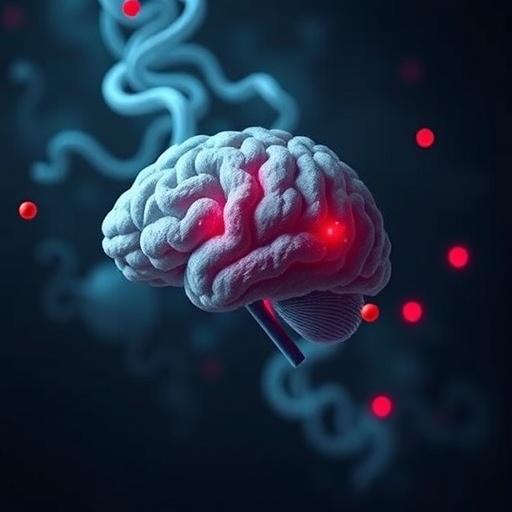In a groundbreaking study published in BMC Psychiatry, researchers have unveiled compelling evidence linking the epigenetic regulation of the AUTS2 gene to suicidal ideation in adolescents afflicted with bipolar depression. This pioneering investigation delves deep into the molecular underpinnings of suicide risk, casting new light on the intricate biochemical pathways contributing to one of the most urgent mental health crises among youth.
Bipolar depression, a debilitating mood disorder characterized by alternating episodes of mania and depression, has long been associated with heightened suicide risk. However, the precise biological mechanisms predisposing certain individuals to suicidal thoughts remain elusive. The AUTS2 gene, previously implicated in neurodevelopment and psychiatric disorders, now emerges as a crucial player influencing suicidal ideation through epigenetic modulation and gene expression.
The study recruited 73 adolescents diagnosed with bipolar depression and subjected them to rigorous psychometric evaluations using the Suicidal Ideation Attributes Scale (SIOSS). Participants were classified into two cohorts based on the presence or absence of suicidal ideation, providing a clear framework to examine molecular distinctions correlating with suicide risk.
Employing state-of-the-art pyrophosphate sequencing techniques, the researchers meticulously mapped the methylation landscape of the AUTS2 gene across 17 CpG sites. DNA methylation, a critical epigenetic modification involving the addition of methyl groups to cytosine bases, plays a pivotal role in gene expression regulation. Altered methylation patterns can silence or activate genes, thereby influencing cellular function and disease phenotypes.
Remarkably, this investigation identified significant hypermethylation at the CpG14.15.16 loci within the AUTS2 gene in adolescents exhibiting suicidal ideation compared to their non-suicidal counterparts. Such differential methylation suggests that epigenetic dysregulation of AUTS2 may be intrinsically linked to neurobiological vulnerability underlying suicidality in bipolar depression.
To unravel the downstream consequences of methylation changes, quantitative reverse transcription polymerase chain reaction (qRT-PCR) assays were conducted to quantify AUTS2 mRNA expression levels. Contrary to the conventional view that increased methylation correlates with gene silencing, the study found elevated AUTS2 expression in the suicidal ideation group. This paradox points toward a nuanced epigenetic mechanism, potentially involving locus-specific methylation that enhances transcriptional activity or disrupts repressors.
Correlation analyses further substantiated the triadic relationships: elevated methylation at CpG14.15.16 loci tightly correlated with increased AUTS2 mRNA expression, which in turn showed a significant association with suicidal ideation severity. These findings underscore a complex biological axis linking epigenomic alterations to transcriptomic shifts, culminating in pathological behavioral manifestations.
Perhaps most striking was the mediation analysis demonstrating that AUTS2 mRNA expression accounted for approximately 30% of the effect between methylation and suicidal ideation. This mediation suggests that methylation’s influence on suicide risk is substantially channeled through changes in gene expression, highlighting AUTS2 as not just a biomarker but a potential mechanistic agent in suicide pathophysiology.
These revelations offer profound implications for future therapeutic strategies. Interventions targeting epigenetic modifications or modulating AUTS2 expression could revolutionize the prevention and management of suicidal behaviors in vulnerable adolescent populations. Personalized medicine approaches integrating epigenetic profiling may soon enable clinicians to stratify suicide risk and tailor interventions with unprecedented precision.
This study also sparks intriguing questions about the role of epigenetics in psychiatric disorders at large. The dynamic regulation of genes like AUTS2 via methylation exemplifies how environmental factors, stress, and developmental trajectories converge at the molecular level to modulate mental health outcomes. Understanding these layers could catalyze breakthroughs extending beyond bipolar disorder into other realms of neuropsychiatric research.
Despite its promising insights, the study acknowledges limitations, including a relatively modest sample size and the cross-sectional design restricting causal inferences. Longitudinal studies probing temporal dynamics of methylation and expression changes alongside clinical trajectories would augment the robustness and translational value of these findings.
Moreover, the interplay between methylation and expression observed here challenges oversimplified models of gene regulation, encouraging deeper exploration of context-dependent epigenetic effects. The precise molecular mechanisms by which hypermethylation elevates AUTS2 mRNA levels warrant further biochemical and biophysical investigation.
In sum, this seminal research charts a novel molecular pathway implicating the epigenetic and transcriptional landscape of the AUTS2 gene in the emergence of suicidal ideation among adolescents grappling with bipolar depression. By bridging psychiatric phenotypes with concrete molecular signatures, it pioneers a new paradigm that transcends symptom-driven diagnostics toward biologically grounded mental health science.
As the mental health community confronts escalating youth suicide rates globally, translating such cutting-edge molecular insights into clinical practice is imperative. This study not only enhances our understanding of suicide biology but also underscores the transformative potential of epigenetic research in unraveling complex neuropsychiatric disorders, ultimately shaping the next generation of diagnostic and therapeutic innovations.
Subject of Research: The epigenetic regulation and mRNA expression of the AUTS2 gene and their association with suicidal ideation in adolescents with bipolar depression.
Article Title: The relationship of methylation and mRNA expression profile of AUTS2 with suicidal ideation in adolescents with bipolar depression.
Article References:
Shen, X., Wang, C., Alimujiang, A. et al. The relationship of methylation and mRNA expression profile of AUTS2 with suicidal ideation in adolescents with bipolar depression.
BMC Psychiatry 25, 543 (2025). https://doi.org/10.1186/s12888-025-06927-9
Image Credits: AI Generated




